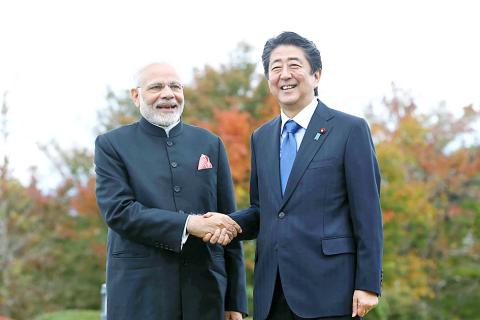The leaders of Japan and India are reaffirming their ties amid growing worries about trade and regional stability.
Indian Prime Minister Narendra Modi, who arrived in Japan on Saturday, yesterday met Japanese Prime Minister Shinzo Abe at a resort area near Mount Fuji.
Modi also visited a nearby plant owned by major Japanese robot maker Fanuc Corp.

Photo: AFP
Relations with China are a major issue shared by Modi and Abe, as their cooperation might balance China’s growing regional influence and military assertiveness.
“The India-Japan partnership has been fundamentally transformed and it has been strengthened as a special strategic and global partnership,” Modi told Kyodo news agency. “There are no negatives, but only opportunities in this relationship, which are waiting to be seized.”
Modi chose Japan among the first nations to visit after taking power four years ago.
He has been urging countries in the Indo-Pacific region to unite against protectionism and cross-border tensions.
In another sign of closer relations, India and Japan are to hold their first joint military exercises involving ground forces, starting next month.
Abe has just returned from China, where he met Chinese President Xi Jinping (習近平) and agreed that the two nations were “sharing more common interests and concerns.”
US President Donald Trump’s policies, which have targeted mostly China with tariffs, but also Japan and other nations, accusing them of unfair trade practices, are working to prod India and Japan to promote their economic ties.
The Japanese Ministry of Foreign Affairs said the leaders had lunch at a hotel in Yamanashi Prefecture, west of Tokyo, and exchanged a wide range of views on pursuing “a free and open” Indo-Pacific region.
Abe told Modi about his trip to China and both sides agreed on the need to cooperate closely on getting North Korea to drop nuclear weapons development, the ministry said in a statement.
Japan’s investment in India still has room to grow. The country is helping India build a super-fast railway system.
Abe has made bolstering and opening the nation’s economy central to his policies, called “Abenomics,” and has encouraged trade, foreign investment and tourism.
Although Japan has long seen the US as its main ally, especially in defense, Abe is courting other ties.
He has also been vocal about free trade, which runs counter to Trump’s moves to raise tariffs.
Earlier this year, Japan signed a landmark deal with the EU that will eliminate nearly all tariffs on products they trade.
European and Japanese leaders pledged to strengthen their partnership in defense, climate change and human exchanges, to send what they called a clear message against protectionism.
Abe and Modi are to hold a more formal summit today in Tokyo.

SECURITY: As China is ‘reshaping’ Hong Kong’s population, Taiwan must raise the eligibility threshold for applications from Hong Kongers, Chiu Chui-cheng said When Hong Kong and Macau citizens apply for residency in Taiwan, it would be under a new category that includes a “national security observation period,” Mainland Affairs Council (MAC) Minister Chiu Chui-cheng (邱垂正) said yesterday. President William Lai (賴清德) on March 13 announced 17 strategies to counter China’s aggression toward Taiwan, including incorporating national security considerations into the review process for residency applications from Hong Kong and Macau citizens. The situation in Hong Kong is constantly changing, Chiu said to media yesterday on the sidelines of the Taipei Technology Run hosted by the Taipei Neihu Technology Park Development Association. With

CARROT AND STICK: While unrelenting in its military threats, China attracted nearly 40,000 Taiwanese to over 400 business events last year Nearly 40,000 Taiwanese last year joined industry events in China, such as conferences and trade fairs, supported by the Chinese government, a study showed yesterday, as Beijing ramps up a charm offensive toward Taipei alongside military pressure. China has long taken a carrot-and-stick approach to Taiwan, threatening it with the prospect of military action while reaching out to those it believes are amenable to Beijing’s point of view. Taiwanese security officials are wary of what they see as Beijing’s influence campaigns to sway public opinion after Taipei and Beijing gradually resumed travel links halted by the COVID-19 pandemic, but the scale of

A US Marine Corps regiment equipped with Naval Strike Missiles (NSM) is set to participate in the upcoming Balikatan 25 exercise in the Luzon Strait, marking the system’s first-ever deployment in the Philippines. US and Philippine officials have separately confirmed that the Navy Marine Expeditionary Ship Interdiction System (NMESIS) — the mobile launch platform for the Naval Strike Missile — would take part in the joint exercise. The missiles are being deployed to “a strategic first island chain chokepoint” in the waters between Taiwan proper and the Philippines, US-based Naval News reported. “The Luzon Strait and Bashi Channel represent a critical access

Pope Francis is be laid to rest on Saturday after lying in state for three days in St Peter’s Basilica, where the faithful are expected to flock to pay their respects to history’s first Latin American pontiff. The cardinals met yesterday in the Vatican’s synod hall to chart the next steps before a conclave begins to choose Francis’ successor, as condolences poured in from around the world. According to current norms, the conclave must begin between May 5 and 10. The cardinals set the funeral for Saturday at 10am in St Peter’s Square, to be celebrated by the dean of the College